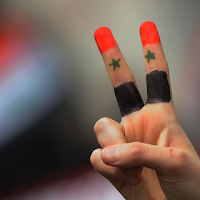Former Bush era Secretary of State Colin Powell has a new book out May 22. As with so many political celebs, it's a book written "with" a professional person who does the actual writing. But it includes quotations from the guy who was once seen as potential presidential or vice presidential material. Based on uncorrected proofs released in advance, what we get once again is Powell lamenting the stain he can't get rid of because of the dead-wrong 85-minute speech he gave to the United Nations Feb. 5, 2003. There he declared convincingly that the United States had irrefutable evidence that Iraq had weapons of mass destruction.
Within five months, that claim had been convincingly refuted.
“Yes, a blot, a failure will always be attached to me and my UN presentation,” the former U.S. secretary of state writes in a new book of leadership parables that draws frequently on his Iraq war experience. “I am mad mostly at myself for not having smelled the problem. My instincts failed me.” Powell, 75, laments that no intelligence officials had the “courage” to warn that he was given false information that Iraq had such weapons during preparations for his February 2003 speech before the U.S. invasion the following month.We've been hearing this crap from the guy for seven years now. It's tedious. It's sickening. It's self-serving. It's bullshit. It's the same old, same old.
Except, not quite. Because Powell keeps changing his story about his interactions in the White House. In 2005, he told Barbara Walters that he was "right there with" the president on the use of force in Iraq. In 2007, he told a group of heavyweights at a conference in Aspen, Colo., that he had spent two-and-a-half hours trying to talk Bush out of using force.
This latest iteration isn't the first time Powell has tried to lay the blame for his bogus U.N. speech on intelligence failures well down the chain of command. Not only has he never held his bosses to account for intentionally distorting what they knew to be untrue, he hasn't owned up to his own distortions.
For instance, he knew full well from his own intelligence source that the aluminum tubes Dick Cheney and Donald Rumsfeld and Condoleeza Rice were claiming as proof of Saddam Hussein's intent to make a nuclear weapon couldn't be used for that purpose. But he didn't pass that information along in his U.N. speech. Or anywhere else.
Most of all, for somebody so concerned about his reputation now, he didn't resign in protest when he learned that what he had said at the U.N. was false. In fact he said in the Walters' interview:
"I'm not a quitter. And it wasn't a moral issue, or an act of a failure of an active leadership. It was knowing what we were heading into, and when the going got rough, you don't walk out."Fabricating evidence to start a war is not a moral issue? Better to be the good soldier than to be good, eh? Hundreds of thousands dead or maimed, millions exiled, trillions of dollars spent. For lies. How about a lament for that from the secretary?
All we get from Powell is a rancid woe-is-me sidestep from responsibility. As he enters his dotage, he claims it was all due to the lack of courage on the part of lower-downs and the failure of his normally good instincts that caused him to make an uncharacteristically bad judgment call.
Stunningly laughable for a guy whose "instincts" led to this remarkable fantasy recounted in the new book:
Powell, who served as national security adviser to President Ronald Reagan, recalls a morning in 1988 when he went to see Reagan and described a problem that needed to be solved that day. Reagan gazed past him at squirrels picking up nuts he had put out for them in the morning by the Rose Garden. It was a lesson in delegating authority and trusting his team to make the right decision, Powell says. “The president was teaching me: ‘Colin, I love you and I will sit here as long as you want me to, listening to your problem. Let me know when you have a problem that I have to solve,’” Powell writes.He can perhaps be excused for believing that a quarter-century ago. But knowing what we know now about the health of Reagan's brain, Powell's continuing view that he was being mentored by a squirrel-gazing president is as ludicrous as the rest of his tales about what put that unerasable blot on his reputation.










